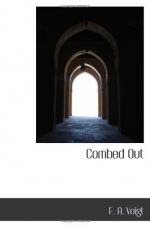“Germany’s in a bad way—Ach Gott, don’t ask me any more, give me something to stop my pain!”
“That’s the retort diplomatic! Send him off to sleep—let’s get the job done.”
When the man had lost consciousness, Captain Grierson, the anaesthetist, put the chloroform bottle aside, jumped down from the stool, and searched the pockets of his helpless patient. He did not find much, however, only a few letters and picture postcards until he came to a deep trouser pocket from which he drew a big German pipe.
“Not a bad souvenir,” he said, as he put it into his own pocket and returned to his stool. Of course this was not stealing, it was merely “scrounging” or “pinching” or “collecting souvenirs,” which is an entirely different thing.
For a time the surgeons worked silently, amputating arms and legs, holding the bare skin between two fingers and cutting the flesh, throwing bleeding bits on to the floor, dressing and bandaging stumps and excised wounds.
Captain Calthrop was grumbling at the tedium of the work when his anaesthetist lit upon a happy thought and said:
“How’d you like to try your hand at giving an anaesthetic? I’ll have a shot at surgery—I’ve never done it before. I’d like to see if I’m any good at it.”
“Right you are,” replied Captain Calthrop, “we’ll change over.”
“Jolly good idea,” added Captain Wycherley at the next table, “we’ll change over too.”
“Right-o,” said his anaesthetist.
And so the two anaesthetists operated and the two surgeons gave anaesthetics. It was, perhaps, rather a dangerous thing to do, but as the wounded men were only Germans it did not matter.
Captain Dowden took no part in this experiment. In fact he even suggested that it was “a bit thick,” but his disapproval did not assume a more tangible form.
After finishing one case each, the four surgeons and anaesthetists changed back again.
“Surgery, isn’t so bad as I thought it would be.”
“Isn’t it—you wait till you get an abdominal!”
“Giving an anaesthetic’s rather a ticklish affair. I thought my man was going to choke to death, he got so blue in the face.”
A few more Germans with slight flesh wounds that only required dressing were brought in, and then the work of the night shift was over.
The surgeons, anaesthetists and sisters trooped out gaily to have tea and cakes in the shed opposite the entrance to the theatre.
Our work was not yet over, for we still had to put everything in order for the day shift.
The operating theatre looked like a butcher’s shop. There were big pools and splashes of blood on the floor. Bits of flesh and skin and bone were littered everywhere. The gowns of the orderlies were stained and bespattered with blood and yellow picric acid. Each bucket was full of blood-sodden towels, splints, and bandages, with a foot, or a hand, or a severed knee-joint overhanging the rim.




